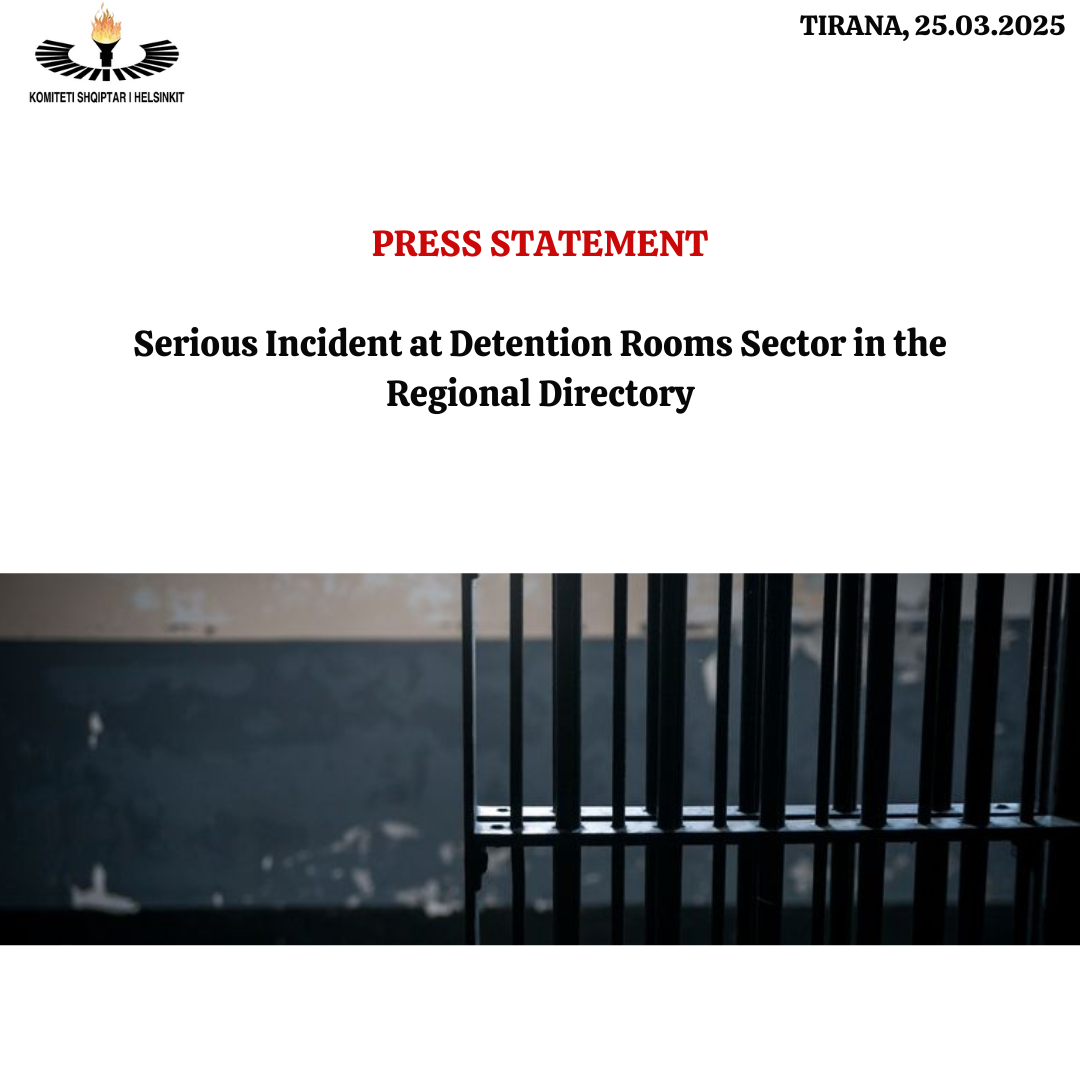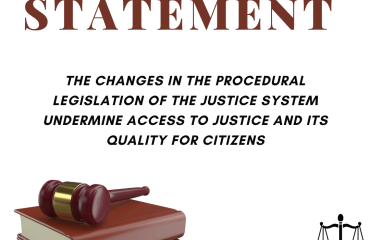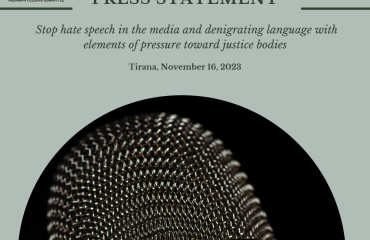According to media reports from 13.03.2025, citizen D.G. committed suicide in the Detention Rooms Sector at the Tirana Regional Police Directory. On the basis of these reports, on 17.03.2025, through a group of observers, AHC verified on site the circumstances of this suicide. Following the monitoring, it resulted that:
Citizen D.G. had been detained under suspicion of having committed the criminal offense of stealing. Form that moment, he claimed that he was a user of serious narcotic substances (cocaine, heroin). For that reason, the staff of the Security Sector (in the absence of the institution’s doctor) sent him to the Tirana University Hopsital Center (TUHC) urgently and, after examination, the toxicology doctor issued a prescription that noted that the citizen was under the situation of toxicomania. He referred the citizen to be followed up by the Security Sector doctor. The prescription did not specify the kind of medicament the citizen should take.
Upon return to the Security Sector, citizen D.G. was examined by the institution’s doctor. The logbook of medical examinations noted “narcotic, unregistered at Action Plus Center,” but it did not specify whether any medication should be given to him or not. On the same day, at 15:30 in the afternoon, the institution’s doctor gave the detained citizen a sedative, Xanax. After taking the medication, at 19:10 on 11.03.2025, the citizen complained of not being in good condition, of having pain, and asked for Methadone. After that complaint, the doctor recommended to the security employee that the citizen was given Xanax again. Asked by observers why he had not given Methadone, the doctor of the Security Rooms clarified that the report of the toxicology specialist doctor did not specify the medicament that should be used.
In these circumstances and on the basis of continued claims, the deputy commissar of the Security Rooms, had written on the logbook of daily actions “during the instruction time, it was left as an errand to take a look at” (referring to citizen D.G.). On 13.03.2025, at 01:20, while patrolling, the responsible officer had noticed through the bars that D.G. had hung himself on the window net and informed the Deputy Commissar right away. The latter had immediately notified the ambulance and the op center. In spite of first aid that was given, the citizen was not able to be brought back to life.
Taking into consideration what was stated above, AHC notes the following:
The toxicology specialist doctor who found that citizen D.G. suffered from toxicomania should have assigned medication in accordance with the diagnosis that was determined.
The doctor of the institution, taking into consideration the contents of the toxicology specialist doctor’s prescription and the determined diagnosis of citizen D.G., should have consulted the toxicology specialist doctor to determine the most appropriate medicament that should have been used in this concrete case, in the circumstances when the citizen complained continuously and requested the Methadone medicament.
On the basis of order no. 1720, dated 20.11.2023 “Treatment and security for individuals arrested/detained in the premises of the State Police, evidencing and resolving their requests/complaints,” it is envisaged that the detained individual has the right to be subjected to medical visits and examinations of a doctor/assistant doctor of the police unit, other specialized doctors, or those chosen and rewarded by the arrestee/detainee. In fact, based on the monitoring that was conducted, in spite of repeated requests for hospitalization and for receiving Metahdone, it does not appear that it was reviewed or that any measures were taken to adequately calm his situation down.
Regarding the care that the overseeing personnel should have demonstrated, it does not appear that the room where citizen D.G. was inspected every 3 or 5 minutes, per internal operational procedures referred to by police officers. AHC was informed that the workload for inspecting the 18 rooms of this sector by one employee makes compliance with the timely requirements very difficult. Based on the examination of this room, it resulted that the ring bell for communication with the personnel did not function.
AHC views as urgent the need for the General Directory of State Police to create working groups consisting of relevant specialists to verify and evaluate the conditions of infrastructural safety in the premises of security rooms across the country, in the context of the positive obligation of the state to protect the lives of detained/arrested citizens and to prevent such acts.
Although not identical, AHC notices with concern that the issues leading to the suicide or loss of life in closed institutions are repeated ones; we bring back to attention the case of the self-hanging of citizen I.M. at the Kavaja Commissariat and citizen J.R., a regular user of narcotic substances, whose health condition worsened while he was kept at the Security Sector of the Tirana Regoinal Police Directory, falling into a coma and then losing his life while at the TUHC. Lastly, AHC considers that the life of every citizen is precious and it is protected under article 2 of the European Convention of Human Rights and the Constitution of the Republic of Albania. Regarding detained/arrested citizens in the security rooms in Police Commissariats, those addicted to narcotic substances, AHC reiterates its recommendation that it is essential that there be special protocols for their medical treatment, drafted in coordination with toxicology specialist doctors of the TUHC.





